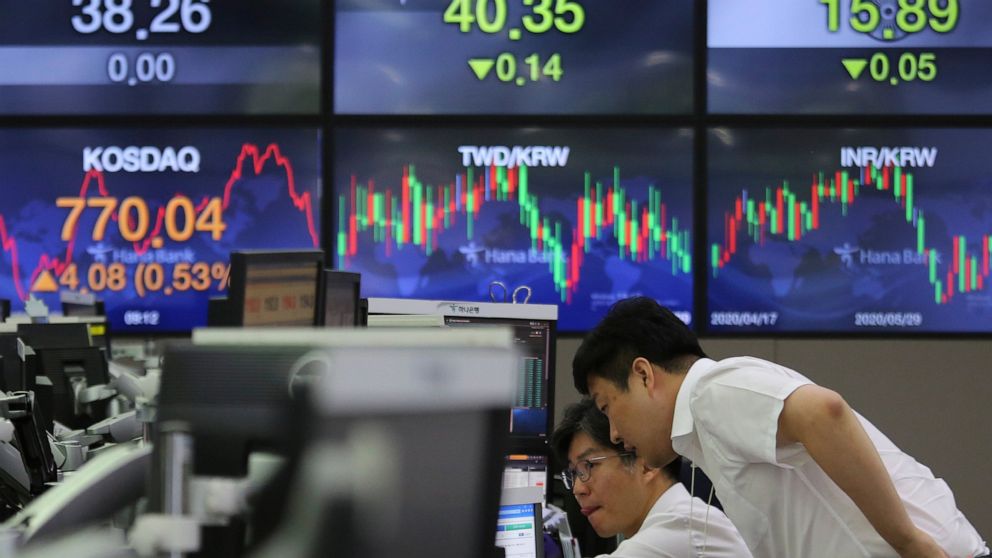Stocks slump amid economy worries; gold remains strong
Stocks are slumping on Wall Street Thursday after a report suggested layoffs continue to ease up across the country, but also that the pace of improvements may be stalling
By
STAN CHOE AP Business Writer
July 9, 2020, 3:36 PM
4 min read
NEW YORK — Stocks are slumping on Wall Street Thursday after a report suggested layoffs continue to ease up across the country, but also that the pace of improvements may be stalling.
The S&P 500 was 1.3% lower, as of 11 a.m. Eastern time, after erasing an earlier modest gain. Treasury yields fell, while the price of gold hung close to its highest level since 2011 in signs of continued caution in the market.
The Dow Jones Industrial Average was down 468 points, or 1.8%, at 25,598. Smaller stocks were dropping more than the rest of the market, which often happens when investors are downgrading their expectations for the economy. The Russell 2000 index of small-cap stocks lost 2.8%.
Tech stocks were holding up better than the rest of the market, as investors continue to bet they can keep growing almost regardless of the economy’s strength. They helped the Nasdaq composite limit its loss to 0.8%.
The number of layoffs sweeping the country is still astoundingly high, with a U.S. government report on Thursday morning showing 1.3 million workers filed for unemployment claims last week. But that’s down from 1.4 million the prior week and from a peak of nearly 6.9 million in late March.
The improvements back up investor optimism that the economy can recover as states and other governments relax restrictions put in place earlier this year to slow the coronavirus pandemic. Such optimism has helped the S&P 500 recently climb back to within roughly 7% of its record set in February, after earlier being down nearly 34%.
But economists point to a troubling slowdown in the pace of improvements. They’re also worried that worsening infection levels across swaths of the U.S. South and West, among other global hotpsots, could derail the budding recovery.
Investors have been watching infection and hospitalization rates in Florida and other big Sun Belt states in particular.
“At best, these numbers are deemed ‘less bad,’ but still seem to be indicating that we are traveling on a ‘slow boat’ to a recovery that looks nothing like the ‘V’ that so many had hoped it would be,” Kevin Giddis, chief fixed income strategist at Raymond James wrote in a report.
Such concerns helped the price of gold hold above $1,800 per ounce. Gold tends to rise when investors are worried about the economy, and on Wednesday it touched its highest price since September 2011, which was shortly after it set its record. Gold was flipping between small gains and losses in Thursday morning trading and was recently down 0.2% at $1,817.10 per ounce.
The yield on the 10-year Treasury, which tends to move with investors’ expectations for the economy and inflation, dropped to 0.62% from 0.65% late Wednesday.
In the stock market, the sharpest losses hit companies whose profits are closely tied to the strength of the economy, such as banks and energy producers.
Financial stocks lost 3.4% for the biggest loss among the 11 sectors that make up the index. Bank of America dropped 2.1%, Citigroup lost 2.6% and Capital One Financial fell 4.8%.
Walgreens Boots Alliance slumped 9.2% for one of the biggest losses in the S&P 500 after it said it lost $1.7 billion in the latest quarter as the pandemic kept its customers around the world at home.
Companies across the country are preparing to report their second-quarter results in upcoming weeks, and forecasts are uniformly dismal.
If the S&P 500 ends up lower for the day, it would be just its second loss in the last eight days. Trading has been erratic lately, though, with many gains coming only after the index bounced up and down repeatedly through the day.
The erratic trading mirrors the market’s movement’s over much of the last month, as investors struggle through massive amounts of uncertainty.
In European stock markets, Germany’s DAX returned 0.6%, while France’s CAC 40 fell 0.5%. The FTSE 100 in London slipped 1.2% after the Treasury chief warned about the depth of the recession there and more big retailers said they had to cut jobs.
In Asia, Chinese stocks continued their huge run. Stocks in Shanghai added another 1.4%, bringing its gain for July to 15.6% and further stoking worries that speculators are in charge of the market.
The Nikkei 225 in Tokyo added 0.4%, as did South Korea’s Kospi. The Hang Seng in Hong Kong gained 0.3%.
Benchmark U.S. crude dropped 3.8% to $39.36 per barrel. Brent crude, the international standard, slipped 2.4% to $42.25 per barrel.
![]()


